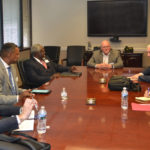COLUMBUS, Ohio (BP)—The Southern Baptist Convention Executive Committee affirmed a report assessing progress the convention has made regarding racial diversity.
According to the committee’s racial diversity report, diversity has increased measurably in the SBC in the past 20 years, but more progress needs to be made in ethnic participation. The committee submitted the report in response to a 2014 motion that the SBC assess progress Southern Baptists have made in racial reconciliation since a 1995 resolution marking the convention’s 150th anniversary.
 Frank S. Page, president of the Southern Baptist Convention Executive Committee, gives a report during the afternoon session June 16 at the Southern Baptist Convention annual meeting at the Greater Columbus Convention Center in Columbus, Ohio. (SBC Photo by Paul W. Lee)The report acknowledged the “appropriateness” of the convention’s 1995 apology to African-Americans for past racism that still reaps a bitter harvest.
Frank S. Page, president of the Southern Baptist Convention Executive Committee, gives a report during the afternoon session June 16 at the Southern Baptist Convention annual meeting at the Greater Columbus Convention Center in Columbus, Ohio. (SBC Photo by Paul W. Lee)The report acknowledged the “appropriateness” of the convention’s 1995 apology to African-Americans for past racism that still reaps a bitter harvest.
The report noted membership on SBC committees and boards does not reflect the diversity the SBC has attracted since the 1995 resolution on racial reconciliation. It examined the composition of the 83-member SBC Executive Committee in the 20 years since the convention approved that resolution.
“If the membership of the Executive Committee serves as a microcosm of the other boards and committees, the presence of the intercultural make-up of the convention was (and is) sorely lacking,” the report states.
Of the 249 individuals nominated and elected to serve on the committee since 1996, eight were non-Anglo, representing only 3.2 percent of the members nominated and elected to the committee.
Appointments have lagged
While the appointment of non-Anglos to committees and boards has lagged, the number of non-Anglo Southern Baptist congregations has increased from 6,083 in 1998, or 13.4 of the total, to 10,103 in 2014, accounting for 20 percent of the total.
The SBC has made critical progress in racial reconciliation, the committee report noted, including the election of national, state and associational officers from varied nationalities and cultures. For example, Fred Luter was elected the first African-American SBC president in 2012.
Sign up for our weekly edition and get all our headlines in your inbox on Thursdays
While the report did not include statistics regarding ethnic diversity among employees of SBC entities, state conventions and associations, the committee noted the employment of two African-American professionals at its headquarters in Nashville.
“We applaud the numerous proactive steps our SBC ministry entities have taken to enlist qualified individuals of all races and ethnicities for senior staff positions; to serve on faculty; to be appointed as missionaries and church planters; to write, edit and produce Christian resources; to service the retirement needs of pastors and church staff; to raise awareness of the moral issues confronting our nation; to equip leaders; and to otherwise serve our churches in a variety of ways,” the committee reported.
Ethnic advisory councils
Executive Committee President Frank S. Page, in concert with the North American Mission Board, has appointed four ethnic advisory councils—Hispanic, African-American, Asian-American and multi-ethnic—to submit reports to help the Executive Committee, NAMB and other SBC entities understand and appreciate the various racial and ethnic perspectives and concerns among Southern Baptists.
“The data indicate that many potential barriers to participation have been identified and are being systematically addressed. There are also numerous sign-posts indicating a higher degree of inclusion of individuals of every race and tribe and tongue in the total fabric of convention life,” the report said. “And, clearly the conversation has changed: increased participation of individuals of all ethnic and racial backgrounds is a topic of intense interest and frequent discussion at all levels of Southern Baptist life.”
To promote the appointment of more ethnic leaders to SBC committees and boards, the committee recommended Southern Baptists take key steps “for at least the next five years so that they become ingrained in our normal way of doing business.”
These include requesting the SBC president, the committee on nominations and the committee on committees have the names of ethnic leaders in full cooperation with the SBC, so appointments and nominations to committees and boards can be drawn from such lists.
Annual Church Profile emphasized
The committee noted the importance of the Annual Church Profile in determining whether leaders may be nominated or appointed to serve on boards and committees.
“It is unlikely that someone from churches that fail to submit an ACP will be selected to serve the convention,” the report noted, “with the result that the diversity their church brings to the convention remains unknown, uncelebrated and unrepresented.”
None of the recommendations can achieve true racial reconciliation outside of the power of the Holy Spirit, the report concluded. “Reconciliation is, at its core, a spiritual concept. True reconciliation is a condition of the heart.”














We seek to connect God’s story and God’s people around the world. To learn more about God’s story, click here.
Send comments and feedback to Eric Black, our editor. For comments to be published, please specify “letter to the editor.” Maximum length for publication is 300 words.